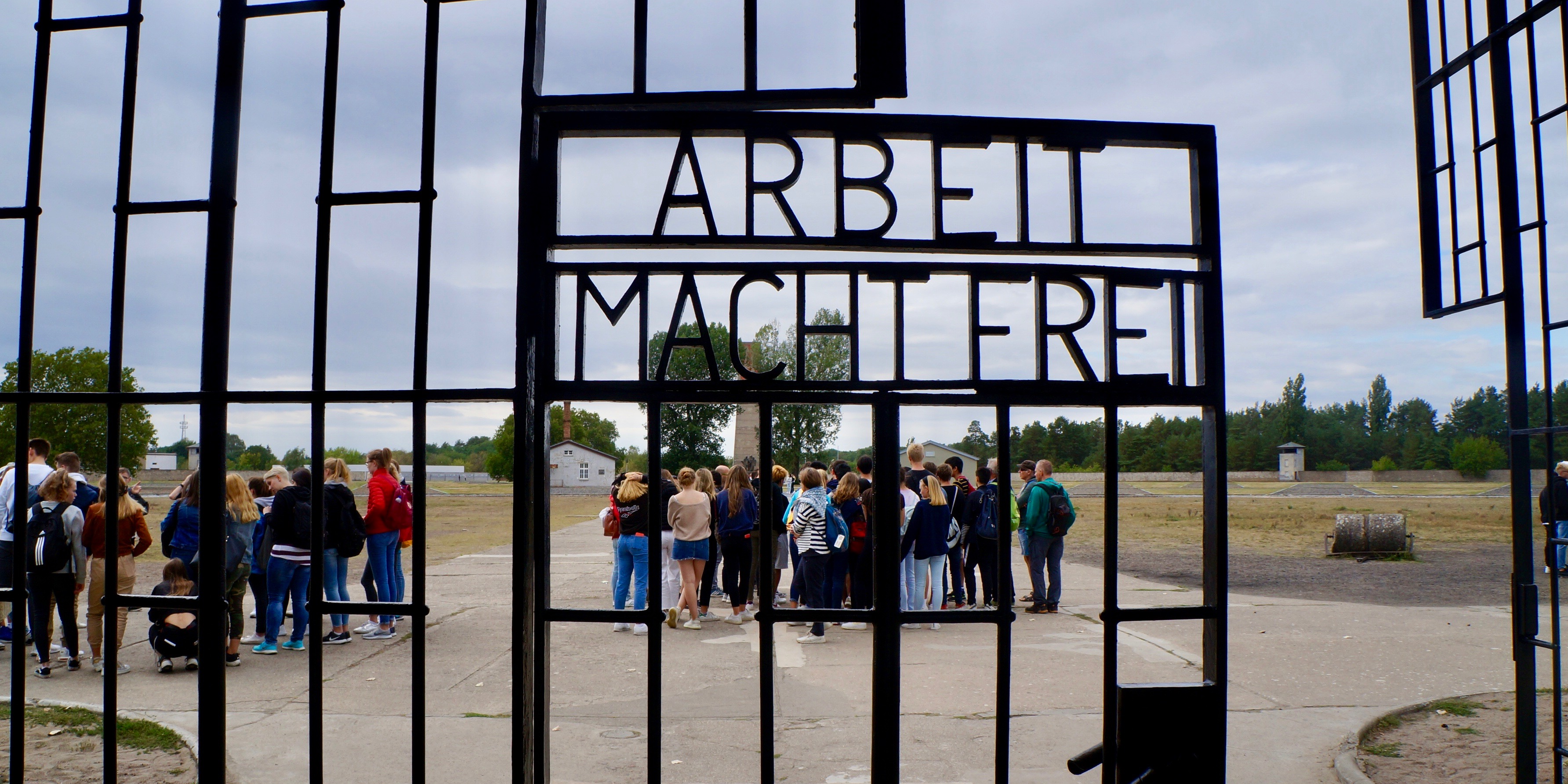- Since the far-right Alternative for Germany party (AfD) swept into federal and state parliament on a wave of anti-immigrant sentiment two years ago, the birthplace of Nazism has had to contend with a political party that tolerates Holocaust denialism, nationalist extremism, and racism.
- In the US, critics of President Donald Trump have drawn comparisons between his administration and the Third Reich. In Germany, critics of the AfD regularly call the party’s members Nazis.
- Many historians and WWII experts find these comparisons simplistic and problematic.
- “Not every racist is a Nazi – that’s too simple,” said Axel Drecoll, director of WWII memorials in the German state of Brandenburg. “Simplification is not our job.”
- But, at the same time, Germany’s far-right party is seeking to undermine the country’s longstanding culture of commemoration and atonement for its Nazi past.
- The AfD’s rhetoric has deeply unnerved those who lead Germany’s WWII memorials and museums, some of whom have cut off contact with AfD politicians.
- And the right-wing movement has brought new attention to the need to grapple with history in Germany.
- Visit Business Insider’s homepage for more stories.
BERLIN, Germany – Since the far-right Alternative for Germany party swept into federal and state parliament on a wave of anti-immigrant sentiment two years ago, the birthplace of Nazism has had to contend with a political party that tolerates Holocaust denialism, nationalist extremism, and racism.
German critics of the party, known as the AfD, regularly deride its members and voters as Nazis. Chants of “Nazis raus!” or “Nazis, leave!” are common at progressive protests.
In the US, President Donald Trump’s critics have similarly drawn comparisons between his administration and the Third Reich.
“That Greenville rally in North Carolina – those chants of ‘send her back’ were absolutely chilling … That’s Nuremberg to me,” Democratic 2020 candidate Beto O’Rourke told an audience in August, referring to Trump’s racist demand that progressive congresswomen of color leave their own country.

'History doesn't stand still and doesn't repeat itself'
Even among those who decry xenophobia, racism, and hyper-nationalism, World War II scholars largely reject using Nazism as a reference point for right-wing movements in the US and Europe.
"I'll emphatically say Trump is not Hitler and Trumpism is not National Socialism," Christopher Browning, an American historian who specializes in the Holocaust and Nazi Germany, told Insider. "You don't want to cry the sky is falling unless the sky is really falling."
Richard J. Evans, a professor of history at Cambridge University and World War II expert, said he sees "echoes" of Nazism in Trump's rhetoric. But he warned that viewing today's politics through the lens of Nazism could obscure the distinct dangers that contemporary phenomena pose.
"History doesn't stand still and doesn't repeat itself," Evans told Insider. "I think the threats to democracy today are more insidious than they were in the past, more creeping as it were, less overtly violent … It's tempting to call authoritarians and anti-democrats Nazis, but I think it's important to have a clear view of what kind of threat they pose to democracy."
This sentiment is also reflected among those who've devoted their careers to keeping the history of the Third Reich alive in the public mind.
Axel Drecoll, the director of Brandenburg's WWII memorials, said calling the AfD a party of Nazis is "a failure" and a gift to the far-right.
"Not every racist is a Nazi - that's too simple," he told Insider. "Simplification is not our job ... It's good for [the AfD] because they can say, 'Ok, everybody is a Nazi in your opinion.'"
 Foto: Axel Drecoll (left), director of the Brandenburg Memorials Foundation, which includes Sachsenhausen, and Horst Seferens, the Foundation's public relations manager.sourceEliza Relman/Insider
Foto: Axel Drecoll (left), director of the Brandenburg Memorials Foundation, which includes Sachsenhausen, and Horst Seferens, the Foundation's public relations manager.sourceEliza Relman/Insider
Confronting the far-right in the birthplace of Nazism
While experts are resistant to comparisons that may minimize Nazism, anti-Semitic attacks are on the rise in both the US and Western Europe. And Germany is grappling with a new effort to undermine its long-standing culture of remembrance and atonement for Nazi crimes.
While the AfD's rhetoric and policies are centered on its opposition to immigration, the party also wants to redesign the way Germans understand their own history. They want more focus on the country's "positive" history and less on war and genocide.
Alexander Gauland, the AfD's national co-leader, has referred to the Nazi era as a "speck of bird poop" in Germany's otherwise "glorious history" and argued his countrymen should be "proud of the achievements of the German soldiers in two world wars."
In 2017, Björn Höcke, a former history teacher and the AfD's leader in the eastern state of Thuringia, condemned Berlin's Memorial to the Murdered Jews of Europe as "a monument of shame." He called for a "180 degree" shift in the way Germans are taught history.
Critics of the AfD see the party's efforts to rewrite history as a threat to German democracy.
"Historical revisionism is part and parcel of AfD party policy," Deidre Berger, a senior adviser at the American Jewish Committee in Berlin, told Insider. "Party leaders are using history as a weapon to attack fundamental democratic rights and freedoms."
The AfD's rhetoric has deeply unnerved WWII survivors' groups, memorials, and museums.

In recent years, there's been an uptick in visitors to some German memorials who play down or even deny Nazi crimes.
Jens-Christian Wagner, the director of Lower Saxony's memorial foundation, told Insider that at least one visitor sporting Nazi symbols on their clothes or otherwise expressing Neo-Nazi sentiments is blocked from entering the former Bergen-Belsen concentration camp every week. The frequency of these incidents has increased in recent years at the memorial.
After the AfD won seats in every state parliament and the federal Bundestag in 2017, multiple WWII survivors' organizations asked Wagner to prevent the party's lawmakers from sitting on Bergen-Belsen's supervisory board. So Wagner asked the AfD of Lower Saxony to publicly renounce high-profile comments critical of Germany's remembrance culture. The lawmakers refused.
"They said we will not do this because we need these far-right people who deny the Holocaust in order to reach our aims, which are to rescue Germany and abolish the Merkel dictatorship," Wagner said.
Last January, the Buchenwald memorial, the largest former Nazi concentration camp in Germany, blocked AfD politicians from attending a ceremony to commemorate the 56,000 people killed there. The memorial director cited the party's refusal to distance itself from "anti-democratic, anti-human rights and revisionist positions."
Drecoll, the director of Brandenburg's memorial foundation, said incidents of Holocaust denial are rare at Sachsenhausen, the former Nazi concentration camp near Berlin. The memorial and museum was visited by about 700,000 people last year - most of them international tourists and groups of German high schoolers.
But last summer, several visitors with a group organized by the AfD leader Alice Weidel repeatedly disrupted a tour of Sachsenhausen, challenging the guide's facts and denying the existence of the camp's gas chamber. The guide was forced to cut off the tour, and the incident made headlines.
Drecoll called the episode "shocking" and said it's been "nearly impossible to have a fruitful conversation" with the AfD about their approach to remembrance culture.

Germany's culture of remembrance is in peril
Burak Yilmaz, a social worker who founded an organization that takes groups of Muslim youth to Auschwitz, said public expressions of anti-Semitism and Islamophobia have surged with the rise of the AfD and the Pegida group (Patriotic Europeans against the Islamisation of the West) in eastern Germany a few years ago.
"What really changed is you can see anti-Semitism in the public and not only in private," Yilmaz told Insider. "I've heard people reading the newspapers in the bus or the train and then saying, 'Ah the Jews control the world and they are planning new wars.'"
Drecoll said the far-right's rhetoric around Germany's culture of remembrance would've been unthinkable five or six years ago.
"There was a consensus that we need this part of our memorial culture and we really need to deal with the Holocaust and the mass crimes to have a guarantee to live in a democratic and law-based state," Drecoll said.
That consensus no longer exists.
Slowly, the party and their allies have normalized the skepticism and resentment that had long been publicly shunned.
Wagner argued that the strength of Germany's liberal democracy rests in large part on the people's efforts to commemorate and atone for its past, which is why the AfD is targeting these traditions.
"If someone wants to change our political system, he must change our culture of memory," he said.

Last Sunday, the AfD won the second-largest share of the vote in elections in Brandenburg and Saxony, both eastern states.
Horst Seferans, the Brandenburg Memorial Foundation's public relations head, argued the former Communist East retains a distinct "political culture" from western Germany, even 30 years after the fall of the Berlin Wall. It took West Germany decades to come to terms with its Nazi past, a process it calls "Vergangenheitsbewältigung."
Meanwhile, the Communist German Democratic Republic effectively shirked responsibility for WWII. Instead, the GDR taught schoolchildren it had rid the country of Nazis, while West Germany integrated the fascists. It called the Berlin Wall the "anti-fascist protection barrier."
"Discussing and working through the Nazi past in public discussions, but also in the families, did not really take place in East Germany," Seferens said. "Probably parts of Nazi ideology were transported over generations in East Germany and this might be part of the problems we have today with the AfD."
Drecoll said the foundation wants to do more to integrate Brandenburg's communities into its work, collaborating with town mayors and schools to better engage young people. And the focus at Sachsenhausen - like memorials across Germany - is beginning to shift from the victims to the perpetrators of Nazism.
"We have to really have a closer look how [the Third Reich] came into being," Drecoll said.
The lessons that apply today?
"Be aware of what may happen if you tolerate racism and discrimination against minorities."
Eliza Relman is reporting from Germany on an Arthur F. Burns fellowship through the International Center for Journalists.

